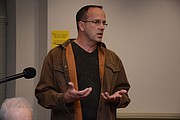John Geer, standing in his doorway, minutes before he was shot by a Fairfax County Police officer. Photo courtesy of Michael Lieberman
Since shooting John Geer dead in the doorway of his Springfield home on Aug. 29, 2013, PFC Adam Torres of the Fairfax County Police Department has remained at work, albeit out of the field, but undisciplined by police and unprosecuted for any criminal wrongdoing.
The next chapter of the nearly two-year-old case began unfolding Monday, July 27 when a special grand jury called by Fairfax County Commonwealth’s Attorney Raymond F. Morrogh first met to hear testimony. Unlike regular grand juries that listen to multiple cases, a special grand jury, provided for in the Virginia Code, convenes to make a decision on one specific case.
The purpose of this such group is to decide whether there is probable cause to put Torres on trial.
According to Michael Lieberman, the lawyer who has been representing Geer’s family and mother of his children Maura Harrington, the special grand jury has six months to issue a report after being impaneled. At that point, the judge has discretion to intervene.
At the end of January this year, Fairfax County released 11,000 pages from the police department investigation of the incident, detailing their findings of what took place that afternoon. The report said Torres was joined by four other officers outside Geer’s home at the time of the shooting. Geer’s best friend Jeff Stewart and father Don Geer were also in the area, close enough to see what happened. They make up the seven witnesses to the shot fired.
Torres claimed to see Geer quickly lower his hands to waist level after a 40-minute period of talking. During that time Geer had rested his hands on the top of the door frame and reached down to scratch his nose from time to time. Torres said the action he saw provoked him to fire. The other officers’ accounts describe Geer’s hands moving slowly at either shoulder or ear level and contradict Torres.
Geer’s father and Stewart remember the version the other officers described.
Lieberman said he doesn’t understand why a special grand jury was needed in this case. “They have seven witnesses,” he said. “Six say one thing, one person says another. To me, that’s more than enough for probable cause.”
Among the witnesses, Morrogh had previously called one of Geer’s two daughters Haylea to participate in the special grand jury. The girls had been with Geer that afternoon, when he became upset hearing that their mother and his partner Harrington was planning to move out of the house. He began throwing some of her belongings out of the house and the daughters called Harrington, who then called the police. When Geer knew the police were coming, he had his daughters go to a neighbor’s basement.
Morrogh was not available for an interview, but in an email said that “The daughter is a witness to the events leading up to the shooting.”
After Lieberman sent a letter questioning the move, Morrogh decided to not call Haylea after all. “She has nothing to offer — to put her on, to say bad things about her father, ” Lieberman said. “To me there’s only seven witnesses. Maura’s not one of them. Haylea’s not one of them. It took place over a split-second.”
Stewart, who is one of the witnesses and who remained on the list to testify before the special grand jury, was worried some of the testimony, including his, might be used in “trashing John’s character.”
“I’m not going to sit there and let them condemn John, try in some way assassinate his character as a defense for an officer shooting him in the chest.”
Shortly after the incident, Stewart told investigators he knew Geer had been drinking that day and had told Stewart when he knew police were coming, something to the effect of, ‘The next time you see me, I may have a bullet in my chest.’
“My open-minded discussion of thoughts that day, in shock, had no bearing of basis, or support from the facts,” Stewart said. “John didn’t want to be shot that day, now we know he said as much.”
“I told the FBI John was executed,” Stewart continued. “This has nothing to do with whatever his intentions were or weren’t. with what I saw that day, he had not made the move yet, to initiate that action. The burden of de-escalating that situation was on the police.”
Stewart is also member of the Fairfax County ad hoc commission to evaluate police policies, which was convened largely in response to Geer’s death and the limited, untimely manner in which the police department and county government handled releasing information about the case.
“John’s death brought to light a lot of issues,” Stewart said. “The Culosis were brought back out, Masters were brought back out,” he added, referring to Dr. Salvatore Culosi and David Masters, two other men shot and killed by Fairfax County police officers. “I guess it’s been worth it to this point — I’m still reserving judgment.”
For Geer’s family, Lieberman said “They’re still upset. Now they don’t have confidence in the system. They’ve been through a horrendous experience for two years where people of authority have just let them down completely. Justice was just denied for the longest time.”


